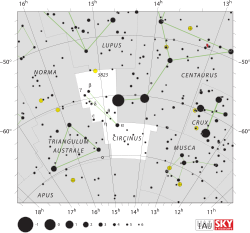南门增二
外观
| 观测资料 历元 J2000.0 | |
|---|---|
| 星座 | 圆规座 |
| 星官 | |
| 赤经 | 14h 42m 30.41958s[1] |
| 赤纬 | −64° 58′ 30.4934″[1] |
| 视星等(V) | 3.19[2] |
| 特性 | |
| 光谱分类 | A7 Vp SrCrEu[3] |
| U−B 色指数 | +0.12[2] |
| B−V 色指数 | +0.24[2] |
| 天体测定 | |
| 径向速度 (Rv) | +7.2[4] km/s |
| 自行 (μ) | 赤经:−192.53[1] mas/yr 赤纬:−233.51[1] mas/yr |
| 视差 (π) | 60.35 ± 0.14[1] mas |
| 距离 | 54.0 ± 0.1 ly (16.57 ± 0.04 pc) |
| 详细资料 | |
| 质量 | 1.5–1.7[5] M☉ |
| 半径 | 1.967 ± 0.066[6] R☉ |
| 表面重力 (log g) | 4.1[5] |
| 亮度 | 10.51 ± 0.60[5] L☉ |
| 温度 | 7,500[5] K |
| 金属量 [Fe/H] | 0.13[7] dex |
| 自转 | 4.4790 ± 0.0001 days[8] |
| 自转速度 (v sin i) | 13.0 ± 1.5[8] km/s |
| 年龄 | ~12 million[9] 年 |
| 其他命名 | |
| 参考数据库 | |
| SIMBAD | 资料 |
南门增二(α Cir/圆规座α)是一颗变星,位于黯淡的南天拱极星座——圆规座。它的视星等为3.19[2],是圆规座内最亮的恒星,在南半球用肉眼可以轻易地看到。从视差测量估算出此恒星离地球的距离为54.0光年(16.6秒差距)[1]。
此恒星属于一种叫快速振荡Ap星的已知变星种类。它的振荡有着多重周期和非径向脉动,其显性周期为6.8分钟[8]。它的恒星光谱有着由外大气层化学分层现象所引起的独有特征。从光谱可以看出它的大气层缺乏碳、氮和氧,但是却含有过于丰富的铬(Cr)[5]。它的恒星光谱型为A7 Vp SrCrEu[3],意思是它是一颗主序星(A型),且大气层内含有较大量的锶(Sr)、铬和铕(Eu)(与一颗像太阳那样的典型行星相比)[11]。
南门增二的质量约为太阳质量的150%至170%[5],而它的半径则是太阳的两倍[6],但是光度却是太阳的10倍。其外部包层的有效温度约7,000K,因此有着A型主序星典型的白色光芒[5][12]。它的自转周期为4.5天,其极点向地球视线的倾斜约为37±4°[8]。
基于南门增二的位置和在太空中移的轨迹,它是移动星群绘架座β移动星群的候选成员。这个星群的成员都共同拥有同一个起源,它们各自的年龄估计约为1千2百万岁。天文学家估计南门增二在这个星群诞生的时候与集合体中心的距离约为91光年(28秒差距)[9]。
参考资料
[编辑]- ^ 1.0 1.1 1.2 1.3 1.4 1.5 van Leeuwen, F., Validation of the new Hipparcos reduction, Astronomy and Astrophysics, November 2007, 474 (2): 653–664, Bibcode:2007A&A...474..653V, arXiv:0708.1752
 , doi:10.1051/0004-6361:20078357
, doi:10.1051/0004-6361:20078357
- ^ 2.0 2.1 2.2 2.3 Johnson, H. L.; et al, UBVRIJKL photometry of the bright stars, Communications of the Lunar and Planetary Laboratory, 1966, 4 (99): 99, Bibcode:1966CoLPL...4...99J
- ^ 3.0 3.1 Gray, R. O.; et al, Contributions to the Nearby Stars (NStars) Project: Spectroscopy of Stars Earlier than M0 within 40 parsecs: The Northern Sample I, The Astronomical Journal, July 2006, 132 (1): 161–170, Bibcode:2006AJ....132..161G, arXiv:astro-ph/0603770
 , doi:10.1086/504637
, doi:10.1086/504637
- ^ Evans, D. S., Batten, Alan Henry; Heard, John Frederick , 编, The Revision of the General Catalogue of Radial Velocities, Determination of Radial Velocities and their Applications (University of Toronto: International Astronomical Union), June 20–24, 1966, 30: 57, Bibcode:1967IAUS...30...57E
|booktitle=被忽略 (帮助) - ^ 5.0 5.1 5.2 5.3 5.4 5.5 5.6 Kochukhov, O.; Shulyak, D.; Ryabchikova, T., A self-consistent empirical model atmosphere, abundance and stratification analysis of the benchmark roAp star α Circini, Astronomy and Astrophysics, June 2009, 499 (3): 851–863, Bibcode:2009A&A...499..851K, arXiv:0903.3512
 , doi:10.1051/0004-6361/200911653
, doi:10.1051/0004-6361/200911653
- ^ 6.0 6.1 Bruntt, H.; et al, The fundamental parameters of the roAp star α Circini, Monthly Notices of the Royal Astronomical Society, June 2008, 386 (4): 2039–2046, Bibcode:2008MNRAS.386.2039B, arXiv:0803.1518
 , doi:10.1111/j.1365-2966.2008.13167.x
, doi:10.1111/j.1365-2966.2008.13167.x
- ^ North, P.; Berthet, S.; Lanz, T., The nature of the F STR lambda 4077 stars. 3: Spectroscopy of the barium dwarfs and other CP stars, Astronomy and Astrophysics, January 1994, 281 (3): 775–796, Bibcode:1994A&A...281..775N
- ^ 8.0 8.1 8.2 8.3 Bruntt, H.; et al, Asteroseismic analysis of the roAp star α Circini: 84d of high-precision photometry from the WIRE satellite, Monthly Notices of the Royal Astronomical Society, June 2009, 396 (2): 1189–1201, Bibcode:2009MNRAS.396.1189B, arXiv:0903.3967
 , doi:10.1111/j.1365-2966.2009.14804.x
, doi:10.1111/j.1365-2966.2009.14804.x
- ^ 9.0 9.1 Nakajima, Tadashi; Morino, Jun-Ichi; Fukagawa, Misato, Potential Members of Stellar Kinematical Groups within 20 pc of the Sun, The Astronomical Journal, September 2010, 140 (3): 713–722, Bibcode:2010AJ....140..713N, doi:10.1088/0004-6256/140/3/713
- ^ V* alf Cir -- Variable Star of alpha2 CVn type, SIMBAD (Centre de Données astronomiques de Strasbourg), [2012-01-04], (原始内容存档于2020-09-15)
- ^ Kaler, James B., ALPHA CIR (Alpha Circini), Stars (University of Illinois), [2012-01-04], (原始内容存档于2012-11-07)
- ^ The Colour of Stars, Australia Telescope, Outreach and Education (Commonwealth Scientific and Industrial Research Organisation), December 21, 2004 [2012-01-16], (原始内容存档于2012-03-10)

